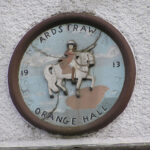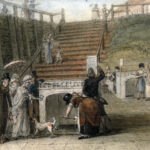12 October 0709: St Wilfrid of York’s soul departs with the birds at Oundle (Northants)
Stephen of Ripon. 1913. Vita Wilfridi I. Episcopi Eboracensis. Passiones Vitaeque Sanctorum Aevi Merovingici. Ed. Wilhelm Levison and Bruno Krusch. Hanover: Hahn. Get it:
.Unedited excerpt
If an excerpt is used in the book, it will be shorter, edited and, where applicable, translated.
(64). Pergens igitur sanctus pontifex noster cum pace et benedictione omnium, tam principum quam subditorum Ultra – Humbrensium, ad australia regna tetendit, ibique abbates suos omnes in adventu eius gaudentes invenit. Illic enim quibusdam supradicta testamenta ex ordine narravita et unicuique eorum secundum suam mensuram aut cum terris vitam monachorum suorum augmentavit aut cum pecunia corda eorum letificavit, quasi prophetiae spiritu ante obitum suum hereditatem heredibus dispertiens. Postremo ad monasterium eius, quod in Undolum positum est, in quo olim Andreae apostoli dedicavit ecclesiam, pervenerunt; ibique statim a languore infirmitatis coangustatus, ita ut intellegeret vicinum sibi esse finem huius vitae, et paucis verbis ammonuit eos, ut memores essent omnium bonorum, quae ante locutus est. Nam omnem vitae suae conversationem memorialiter prius enarravit Tatberhto presbitero, videlicet propinquo suo, quadam die equitantibus illis per viam, quasi praesciens obitum suum; necnon recordatus est omnes terras in diversis locis, quas abbatibus ante dederat aut tunc dare iussit, ut erat coenobium in Hagustaldęsae, quod Accan presbitero, qui post eum fuit beatae memoriae gratia Dei episcopus, in possessionem dare praecepit. Postquam pauca locutus est, benedixit eos, sicut Iacob benedixith filios suos, et cum quiete, non cum gemitu et murmure, capud ad cervical lectuli inclinavit et requievit; illi vero in choro die noctuque indesinenter psalmos canentes et cum fletu miscentes, usque dum in psalmo CIII. ad versiculum illum pervenerunt, in quo dicit: Emitte spiritum tuum, et creabuntur, et renovabis faciem terrae. Tunc sanctus pontifex noster emisit spiritum suum, et omnes stupefacti sunt, audientes ea hora sonitum quasi avium advenientium. Nube testium confirmante, abbatem ordinatum acceperunt, qui pro amore patris sui sancti pontificis nostri multa bona facere consuevit. Nam omni die pro eo missam singularem celebrare et omni ebdomada quintam feriam, in qua obiit, quasi dominicam in epulis venerare et anniversaria die obitus sui universas decimarum partes de armentis et de gregibus pauperibus a populi sui dividere omnibus diebus vitae suae ad gloriam Dei constituit, absque his elemosinis, quas omni die pro se et pro anima episcopi sui semper nominatim simul indigenis et Deo dabat.
My translation:
Then our holy pontiff, proceeding with the peace and blessing of all, both the princes and the subjects of Northumbria, made his way to the southern kingdoms, and there he found all his abbots rejoicing at his coming. For there the aforesaid will was narrated to some of them, and for each of them, according to their measure, either he increased the livelihoods of their monks with lands, or he gladdened their hearts with money, as if by the spirit of prophecy he was distributing his inheritance among his heirs before his death. At last they arrived at his monastery in Oundle, where he had once dedicated a church to Andrew the Apostle. There he was at once constrained by the languor of infirmity, and he knew that the end of this life was near. In a few words he admonished them to be mindful of all the good things he had told them in the past. For, as if foreseeing his death, he had recounted his memories of his life to his kinsman the priest Tatberht one day as they were riding along together. He also recalled all the lands in various places which he had previously given, or now wished to give, to the abbots, including the convent at Hexham, which he ordered be given to the priest Acca, after him bishop of blessed memory. After he had spoken a little, he blessed them, as Jacob blessed his sons. Then, peacefully, without groan or murmur, he leant his head on his pillow and rested. The others sang psalms in choir without cease, day and night, mixed with weeping, until they came to that verse in Psalm 104 which says, “Thou sendest forth thy spirit, they are created: and thou renewest the face of the earth.” Then our holy pontiff gave up his spirit, and all were amazed, hearing at that hour the sound of birds approaching, as was confirmed by a cloud of witnesses. They then received the abbot who had been appointed, who for the love of his father, our holy pontiff, was wont to do many good works. For he decided to celebrate a special mass for him every day, and to celebrate the weekday on which he died with feasts as if it were Sunday, and on the anniversary of his death to divide all the tithes from the herds and flocks among the poor of his people for all the days of his life and to the glory of God, apart from those alms which he always gave every day to the natives and to God for himself and for the soul of his bishop, and always in his name.
Comment
Comment
Date relies on the discussion in Colgrave:
October 12th is the day always kept in his honour, though this was not a Thursday [as given in the text] in 709 but a Saturday. On the other hand, the Psalm quoted … occurs in the ordinary course of the Psalms for Saturday mattins in both the Roman and Benedictine breviaries. This would support the traditional date of October 12th. Bede in his Martyrologium Poeticum dates it April 24th. This however does not fit in with the events. It was in fact the date of his Translation Festival. The statement which occurs in Bright and Plummer, quoted from Raine, that the obituary of the church of Durham gives October 3rd as the date of his death is inaccurate. The MS reads quite clearly iii id Oct. [i.e. 13 October]. The date of his death cannot really be settled on the evidence we have at present.
(Colgrave 1985)
See the same page for souls as birds, and Fridegoda’s description of his spirit flying from his body “like a bird freed from the lime of the flesh.” Quite irrelevantly, I imagine that the bird wasn’t Leeds’s owl:
On the window-sill the night before [Kafka] died Dora Dymant found an owl waiting. The owl has a complex imagery in art. Just as in Freudian psychology an emotion can stand for itself and its opposite, so is the owl a symbol of both darkness and light. As a creature of the night the owl was seen as a symbol of the Jews, who, turning away from the light of Christ, were guilty of wilful blindness. On the other hand the owl was, as it remains, a symbol of wisdom. It is fitting that this bird of ambiguity should come to witness the departure of a man who by belief was neither Christian nor Jew, and had never wholeheartedly felt himself a member of the human race. He had written of himself as a bug and a mouse, both the natural prey of the bird now waiting outside the window (Bennett 2014).
Colgrave has indigenis in the last line as needy (indigens) where I have native (indigenus), probably because he knows more than me about medieval Latin declension.
Something to say? Get in touch
Similar
 23 January 1643: Thomas Fairfax, the Rider of the White Horse, captures Leeds from the Beast with the help of Psalm 68
23 January 1643: Thomas Fairfax, the Rider of the White Horse, captures Leeds from the Beast with the help of Psalm 68 19 October 1816: Serenaded by the military, decorated barges leave Leeds for Liverpool to celebrate the completion, after almost 50 years, of the canal uniting east and west
19 October 1816: Serenaded by the military, decorated barges leave Leeds for Liverpool to celebrate the completion, after almost 50 years, of the canal uniting east and west 5 August 1661: John Ray is told that a knocked-through lighting niche in the Anglo-Saxon crypt under Ripon minster is a chastity test device
5 August 1661: John Ray is told that a knocked-through lighting niche in the Anglo-Saxon crypt under Ripon minster is a chastity test device 24 February 1777: Penniless bohemian Tom Fashion calls on redneck Yorkshire moneybags Sir Tunbelly Clumsy during tonight’s London première of a Sheridan play
24 February 1777: Penniless bohemian Tom Fashion calls on redneck Yorkshire moneybags Sir Tunbelly Clumsy during tonight’s London première of a Sheridan play
Comment
Comment
Something to say? Get in touch
Search
Donate
Music & books
Place-People-Play: Childcare (and the Kazookestra) on the Headingley/Weetwood borders next to Meanwood Park.
Music from and about Yorkshire by Leeds's Singing Organ-Grinder.


 Bluesky
Bluesky Extwitter
Extwitter